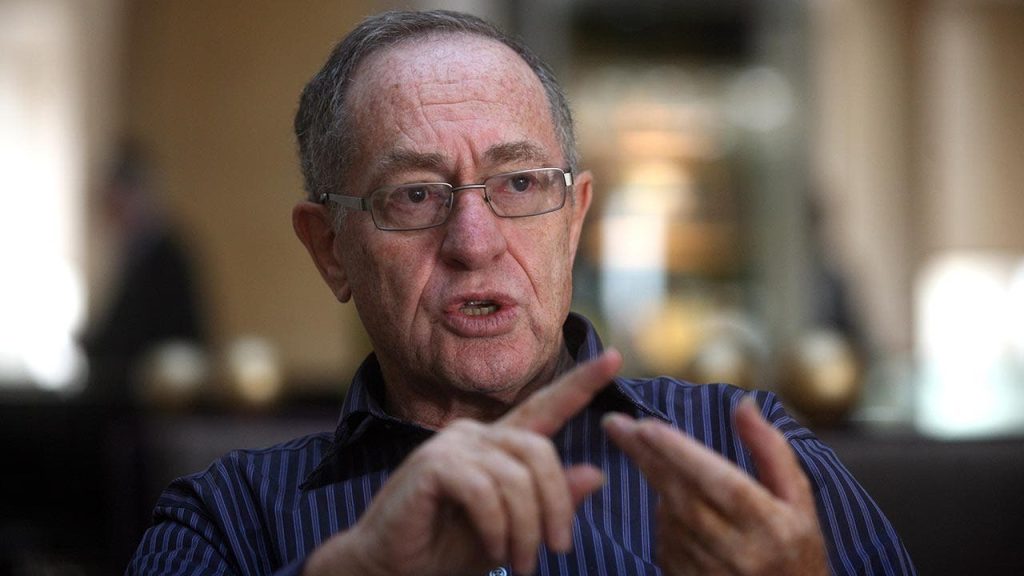Renowned attorney Alan Dershowitz recently announced his departure from the Democratic Party, citing his disillusionment with several Democratic lawmakers he perceives as “anti-Jewish.” During an interview with radio host Zev Brenner, Dershowitz expressed his disgust with the Democratic National Convention, which he believes gave legitimacy to anti-Israel speakers and protesters. This experience, combined with Vice President Kamala Harris failing to preside over a joint session of Congress during an address by Israeli Prime Minister Benjamin Netanyahu, led Dershowitz to become an Independent. He expressed his desire to wait and see how the current administration deals with Iran before revealing his presidential voting choice.
Dershowitz stated that his decision to leave the Democratic Party had been building for some time, emphasizing that many factors contributed to his departure. He highlighted Democratic lawmakers such as Reps. Alexandria Ocasio-Cortez, Elizabeth Warren, and Bernie Sanders, whom he views as anti-Israel, as well as Rev. Al Sharpton, who has faced accusations of antisemitism. The attorney also mentioned the presence of anti-Israel protesters outside the recent Democratic convention in Chicago as another reason for his decision. Dershowitz firmly asserted that the Democratic Party no longer aligns with his beliefs and values.
The Democratic Party has experienced internal discord in the aftermath of an attack on Israel by Hamas on October 7. Some party members have refrained from condemning the terror group and placed blame on Israeli Prime Minister Benjamin Netanyahu for Israel’s military response. While many Democrats have called for a ceasefire and urged Israel to use restraint, they have failed to hold Hamas and Hezbollah – an Iran-backed terror group located in Lebanon – to the same standard. Dershowitz’s departure from the Democratic Party underscores the ideological divide within its ranks regarding Israel and Middle East policy.
Dershowitz plans to monitor the current administration’s approach to Iran and Israel before making a decision on his presidential voting choice. He expressed his desire to support policies that prioritize Israel’s security, particularly in the face of increasing threats in the Middle East. The attorney emphasized the importance of standing against antisemitism and anti-Israel sentiment, and he believes that neither the Democratic Party nor the recent National Convention align with these values. His decision to leave the party reflects a larger trend of Jewish Americans reevaluating their political affiliations in response to perceived shifts in attitudes towards Israel and the Jewish community within the Democratic Party.
Many prominent Jewish Americans, including Dershowitz, have expressed concern over what they see as a growing tolerance for anti-Israel views within the Democratic Party. The failure of some party members to condemn terrorist acts against Israel and hold perpetrators accountable has led to a sense of disillusionment among Jewish voters. Dershowitz’s decision to leave the party underscores the challenges facing the Democratic leadership in balancing support for Israel and addressing internal divisions on Middle East policy. As the party navigates these complex issues, maintaining unity and inclusivity will be critical in ensuring continued support from Jewish American voters and upholding principles of tolerance and respect.
In conclusion, Alan Dershowitz’s departure from the Democratic Party highlights the broader tensions within the party regarding Israel, antisemitism, and Middle East policy. His decision to become an Independent reflects his concerns about the party’s stance on these issues and his desire to align himself with political leaders who prioritize Israel’s security and oppose anti-Jewish sentiment. As the Democratic Party grapples with internal divisions and external challenges, addressing the concerns of Jewish Americans and other supporters of Israel will be essential in maintaining unity and credibility. Dershowitz’s departure serves as a reminder of the complex intersection of politics, ideology, and values in shaping individuals’ political affiliations and underscores the ongoing debate within the Democratic Party on these crucial issues.


